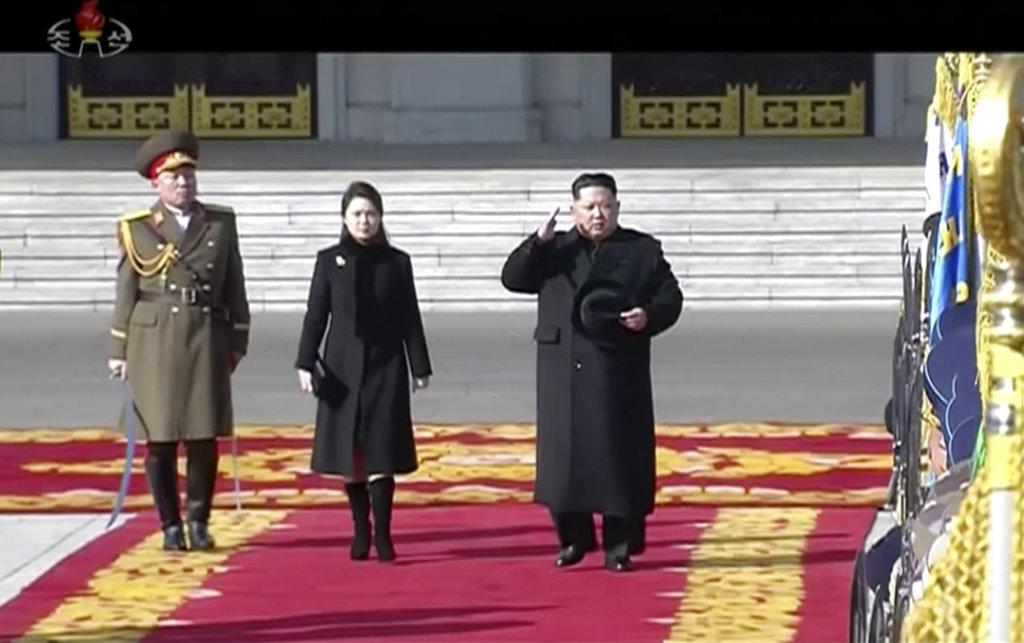
In this image made from video released by KRT on Feb. 8, 2018, North Korean leader Kim Jong Un, right, inspects honor guards, along with his wife Ri Sol Ju, center, during a military parade in Pyongyang, Thursday, Feb. 8 2018. North Korea held a military parade and rally on Kim Il Sung Square on Thursday, just one day before South Korea holds the opening ceremony for the Pyeongchang Winter Olympics. (KRT via AP Photo)
SEOUL, South Korea — North Korea held a massive military parade highlighted by intercontinental ballistic missiles in its capital on Thursday, just one day before South Korea hosts the opening ceremony of the Pyeongchang Winter Olympics.
Kim Jong Un, dressed in a long black winter coat, was shown walking on a red carpet with his wife at the beginning of the event, which North Korea’s state-run television broadcast hours after it was over.
It began with thousands of goose-stepping troops lined up in Kim Il Sung Square to form words and slogans. Later, North Korea displayed its most powerful strategic weapons, including what appeared to be Hwasong-14 and Hwasong-15 ICBMs rolled out on launcher trucks. Analysts believe the missiles, which were successfully tested last year in three launches, could potentially reach deep into the U.S. mainland when perfected.
Virtually all foreign media were excluded from the event.
In a televised speech, Kim said the parade marks North Korea’s emergence as a “global military power” despite facing the “worst sanctions.”
He called for his military to maintain a high level of combat readiness against the United States and its “followers” so that “invasive forces cannot infringe upon or harass the republic’s sacred dignity and autonomy even by 0.001 millimeters.”
In this image made from video by North Korea’s KRT, a military parade is held in Pyongyang, North Korea Thursday, Feb. 8, 2018. North Korea held the military parade and rally on Kim Il Sung Square on Thursday, just one day before South Korea hosts the opening ceremony of the Pyeongchang Winter Olympics. (KRT via AP Video)
“As long as imperialism remains on the Earth and as long as the United States’ hostile policy on North Korea continues, the mission of our military, which is to protect our country and people and secure peace, can never change,” he said. Kim was joined int the stands by several senior officials, including the country’s nominal head of state, Kim Yong Nam, who will lead a high-level delegation to the South Korea Olympics on Friday that will also include leader Kim’s sister, Kim Yo Jong.
Kim Jong Un didn’t make any comments about the Olympics in the parts of his speech that were broadcast. The coverage of the parade seemed heavily edited.
North Korea had said it would hold a big event to mark the 70th anniversary of the founding of its military. Feb. 8 has been seen as a less important founding anniversary but made something of a comeback in 2015 and was elevated further this year in part because it is the 70th — a nice round number.
The parade also featured tanks, armored vehicles, jets flying over the square in formation to make a “70,” and thousands of people dressed in red, white and yellow creating the letters “Kim Jong Un” in Korean and the ruling Workers’ Party’s symbol of the brush, hammer and sickle. The North also rolled out what appeared to be a Hwasong-12 intermediate range missile, which it flew over Japan twice last year as it stepped up the aggressiveness of its weapons tests.
In this image taken from video footage, North Korean military personnel salute as they lay flowers in front of giant statues of Kim Il Sung and Kim Jong Il on Mansu Hill in central Pyongyang, Thursday, Feb. 8, 2018. North Korea held a military parade and rally on Kim Il Sung Square on Thursday, just one day before South Korea holds the opening ceremony for the Pyeongchang Winter Olympics. (AP Photo)
The Olympics probably were also a big factor in North Korea’s decision to hold the parade.
Kim Jong Un has gone out of his way to make sure the North will hold attention throughout the games.
Following a last-minute proposal during Kim’s annual New Year’s address, North Korea is sending 22 athletes to compete in the Olympics and a delegation of more than 400 musicians, singers, martial artists and members of a cheering group to the games.
Kim is also dispatching his younger sister, Kim Yo Jong, to attend the opening ceremony. That in itself is a major development — she is one of his closest confidants, holds a senior party position and her trip would mark the first time any member of the ruling Kim family has visited the South since the Korean War. She will meet South Korean President Moon Jae-in at a luncheon, Moon’s spokesman said Thursday.
The North’s conciliatory moves related to the Olympics have generally been welcomed in the South. The parade, however, was seen as more sensitive.
Though possibly best known for their legions of goose-stepping troops, North Korean military parades are the country’s primary means of showing off its most recent advances in military technology — sometimes with aspirational mock-ups.
The North unveiled five new kinds of missiles at its most recent major military parade last April.